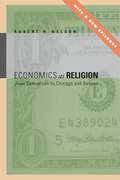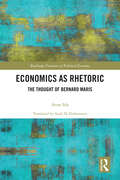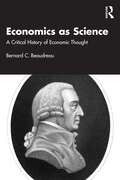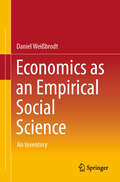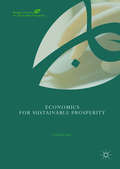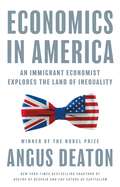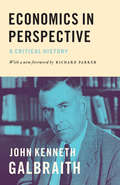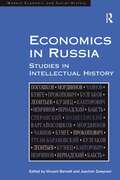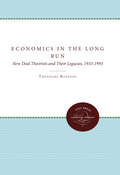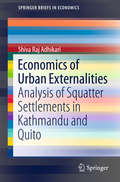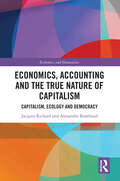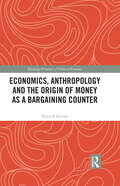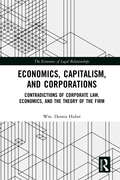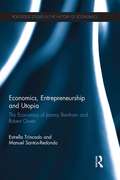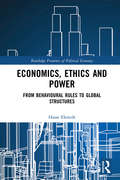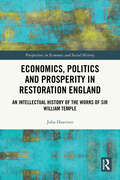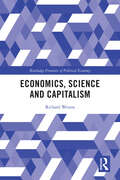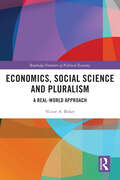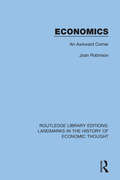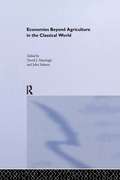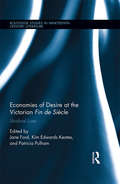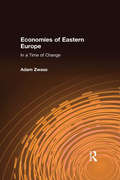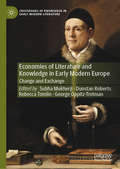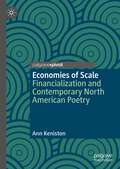- Table View
- List View
Economics as Religion: From Samuelson to Chicago and Beyond
by Robert H. NelsonRobert Nelson’s Reaching for Heaven on Earth, Economics as Religion, and The New Holy Wars: Economic Religion Versus Environmental Religion in Contemporary America read almost like a trilogy, exploring and charting the boundaries of theology and economics from the Western foundations of ancient Greece through the traditions that Nelson identifies as “Protestant” and “Roman,” and on into modern economic forms such as Marxism and capitalism, as well as environmentalism. Nelson argues that economics can be a genuine form of religion and that it should inform our understanding of the religious developments of our times. This edition of Economics as Religion situates the influence of his work in the scholarly economic and theological conversations of today and reflects on the state of the economics profession and the potential implications for theology, economics, and other social sciences.
Economics as Rhetoric: The Thought of Bernard Maris (Routledge Frontiers of Political Economy)
by Anne IslaBernard Maris was killed in Paris on January 7, 2015, during the terrorist attack against the satirical magazine Charlie Hebdo. He remains one of the most original intellectuals of contemporary France, but despite being a uniquely original heterodox thinker, his international reputation has been compromised by the fact that his writings are inaccessible to non-French speakers. This book remedies that.By providing an overview of Bernard Maris’ life and intellectual trajectory as well as an English translation of an anthology of his most relevant writings, this volume provides the international audience – for the first time ever – the chance to know and understand the contribution of this major heterodox economist. An outstanding and atypical figure in economic thought and a virulent critic of mainstream dominant economics, he was also an all-round actor and thinker of his time. Through rigorous reasoning, he questioned the notion of well-being, which, he argued, is too often conflated with having more. Enslavement by work, or the endless destructive accumulation of natural wealth, is also inherent to the capitalist system. Probably his most original contribution is his epistemological reflection on the very nature of economics and his appraisal of this discipline as a form of rhetoric.This book will be of great interest to readers in heterodox economics, economic methodology, epistemology, and French literature and culture more broadly.
Economics as Science: A Critical History of Economic Thought
by Bernard C. BeaudreauThis book provides a critical approach to the study of economic thought – from neoclassical economics, to Marxian economics, and to Keynesian economics – through the lens of science and the scientific method.It examines the collection of ideas that constitute the core of economic thought in the five basic fields of economics: growth theory, income distribution, macroeconomics, price theory and international trade. In each of these, the analysis is chronological, detailing the various events and developments that led scholars to inquire into the underlying mechanics of the phenomena in question. This is followed by a critical examination of the various scholarly contributions, including those of Nobel Prize laureates, in terms of their scientific merit. Each of the five core chapters begins with a listing of chapter objectives and ends with a summary, as well as discussion questions to encourage debate. Short excerpts from the key works are provided to allow the reader first-hand exposure to primary sources.Reinforcing the idea that economics is a scientific endeavor, Economics as Science: A Critical History of Economic Thought sets out to demonstrate the relevance of the tools and techniques students of economics acquire during their studies in understanding economic phenomena throughout the ages. It will be an invaluable resource for students of the history of economic thought and economics more generally.
Economics as an Empirical Social Science: An Inventory
by Daniel WeißbrodtEconomics still adheres entirely unreflectively to a mechanistic worldview and machine thinking. Epistemologically, it thus remains in the 19th century, and its assumptions and theories, methods, and models therefore stand in stark contradiction to the findings of all other social and natural sciences as well as a multitude of empirical facts. Through a discourse-analytical examination of sixteen basic concepts in economics, based on twelve standard economics textbooks, their ideahistorical origin and use are worked out and compared and related to the current state of knowledge of other disciplines. This reveals the structural, methodological, and content errors of economics in a clear manner. Especially for critical students, who have long been demanding an economics that is in line with the current state of research and faces the challenges of the 21st century, this opens up the possibility of a new approach to economics. The Content Discourse-analytical examination of fundamental assumptions and concepts of economics from "labor" to "wealth" Structural, methodological, and content critique of economic thinking from an epistemological perspective Critical examination of the use of empirical and statistical data, the method of gaining knowledge, and the model thinking in economics
Economics for Sustainable Prosperity (Binzagr Institute For Sustainable Prosperity Ser.)
by Steven HailThe central argument of this book is that the foundations for sustainable prosperity lie in an approach to economic management based on modern monetary theory and a job guarantee. This approach builds on the work of Keynes, Kalecki, Minsky, Davidson, Godley and other Post- Keynesian economists—as well as research by behavioral economists including Simon, Kahneman and Loewenstein—to explore the role that a permanent, equitable job guarantee could play in building an inclusive, participatory and just society. Orthodox (neoclassical) economics, in its various forms, has failed to deliver sustainable prosperity. An important reason for this failure is its lack of realistic foundations. It misrepresents both human nature and economic institutions, and its use as a frame for the development and assessment of economic policy proposals has had disastrous consequences for social inclusion and the quality of life of millions of people. This book discusses an alternative, more realistic and more useful set of economic foundations, which could deliver the opportunity of a decent quality of life with dignity to all.
Economics in America: An Immigrant Economist Explores the Land of Inequality
by Angus DeatonFrom the Nobel Prize–winning economist and New York Times bestselling coauthor of Deaths of Despair and the Future of Capitalism, candid reflections on the economist&’s craftWhen economist Angus Deaton immigrated to the United States from Britain in the early 1980s, he was awed by America&’s strengths and shocked by the extraordinary gaps he witnessed between people. Economics in America explains in clear terms how the field of economics addresses the most pressing issues of our time—from poverty, retirement, and the minimum wage to the ravages of the nation&’s uniquely disastrous health care system—and narrates Deaton&’s account of his experiences as a naturalized US citizen and academic economist.Deaton is witty and pulls no punches. In this incisive, candid, and funny book, he describes the everyday lives of working economists, recounting the triumphs as well as the disasters, and tells the inside story of the Nobel Prize in economics and the journey that led him to Stockholm to receive one. He discusses the ongoing tensions between economics and politics—and the extent to which economics has any content beyond the political prejudices of economists—and reflects on whether economists bear at least some responsibility for the growing despair and rising populism in America.Blending rare personal insights with illuminating perspectives on the social challenges that confront us today, Deaton offers a disarmingly frank critique of his own profession while shining a light on his adopted country&’s policy accomplishments and failures.
Economics in Perspective (A Critical History)
by John Kenneth GalbraithGalbraith gives students and professional economists alike the history behind current economic concepts. He outlines the ethical judgments that remain from the household economies of the Greeks to modern capitalism.
Economics in Perspective: A Critical History
by John Kenneth Galbraith Richard ParkerIn Economics in Perspective, renowned economist John Kenneth Galbraith presents a compelling and accessible history of economic ideas, from Aristotle through the twentieth century. Examining theories of the past that have a continuing modern resonance, he shows that economics is not a timeless, objective science, but is continually evolving as it is shaped by specific times and places. From Adam Smith's theories during the Industrial Revolution to those of John Maynard Keynes after the Great Depression, Galbraith demonstrates that if economic ideas are to remain relevant, they must continually adapt to the world they inhabit. A lively examination of economic thought in historical context, Economics in Perspective shows how the field has evolved across the centuries.
Economics in Russia: Studies in Intellectual History (Modern Economic And Social History Ser.)
by Joachim ZweynertThe history of Russian economic ideas from the sixteenth century to contemporary times is a fascinating, tumultuous yet neglected topic among Western scholars. Whilst over the last 15 years increasing amounts of work has been done on the subject, co-operation between Russian and Western researchers in this field leaves much to be desired. In order to improve this situation, this volume unites Russian and non-Russian researchers together to provide an overview of the current state of the topic and to give a stimulus for further research. Bringing together scholars from the UK, Germany, Japan, Australia, Finland and Russia, the collection puts forward differing, yet complimentary, perspectives on the long-term history of Russian economic ideas. Offering a broad collection of articles covering the period from the seventeenth to the twentieth centuries, authors have approached the subject from diverse theoretical angles. Contributions in the tradition of Blaug and Schumpeter focusing on economic analysis in a narrower sense, and contributions that - in line with authors like Pribram or Perlman/McCann - deal with economic thought in the context of history and culture, are all represented. In terms of content, the editors have encouraged approaches that represent different economic traditions in order to encourage a diversity of opinions on the national development of Russian economics. As such the volume offers a broad and very relevant assessment of the subject for both historians and economists alike.
Economics in the Long Run: New Deal Theorists and Their Legacies, 1933-1993
by Theodore RosenofThough understandably preoccupied with the immediate problems of the Great Depression, the generation of economists that came to the forefront in the 1930s also looked ahead to the long-term consequences of the crisis and proposed various solutions to prevent its recurrence. Theodore Rosenof examines the long-run theories and legacies of four of the leading members of this generation: John Maynard Keynes of Great Britain, who influenced the New Deal from afar; Alvin Hansen and Gardiner Means, who fought over the direction of New Deal policy; and Joseph Schumpeter, an opponent of the New Deal. Rosenof explores the conflicts that arose among long-run theorists, arguing that such disputes served eventually to set the stage for the emergence and domination of a short-run Keynesian approach to economic policy that collapsed under the impact of 1970s stagflation. Tracing the subsequent revival of long-run theories, Rosenof demonstrates their relevance to an understanding of the economy's problems over the past quarter-century and to the current debate over public policy.Originally published in 1997.A UNC Press Enduring Edition -- UNC Press Enduring Editions use the latest in digital technology to make available again books from our distinguished backlist that were previously out of print. These editions are published unaltered from the original, and are presented in affordable paperback formats, bringing readers both historical and cultural value.
Economics of Urban Externalities
by Shiva Raj AdhikariThisbook provides a fresh look at measuring negative externalities in theurbanization process. Meeting the challenges that come hand-in-hand with thecontemporary age of rapid urbanization demands more extensive empiricalknowledge. While most urbanization research focuses on positive externalities,this book is designed to offer insights into possible sources of negativeexternalities and the measurement thereof. In economics, the measurement ofexternalities is a challenging task that demands innovative research designs;however, previous research has failed to capture all of these externalities. The technique described in this book is carefully designed to measure negativeexternalities, particularly those related to squatter settlements that havebeen hitherto largely ignored by urbanization literature. The existence ofnegative externalities and the unintended consequences of rapid urbanization,particularly those related to squatter settlements, can be found in LatinAmerica and Asia. This book provides comparative insights based on extensiveprimary surveys of households in squatter and non-squatter settlements ofKathmandu, Nepal and Quito, Ecuador. It is considered a case study that willimprove the understanding of urbanization issues between Latin America andAsia. Societal benefits can be improved through the reduction of negativeexternalities. This book helps policy makers in Kathmandu and Quito fine-tunetheir policies to address the source of urban externality, as well as providenew insights into the nexus between urbanization and development. An investmentin the reduction of negative externalities is profitable, thus presenting thegovernment and international partners with a great opportunity. This bookcontributes to existing literature and will be useful for researchers andstudents.
Economics, Accounting and the True Nature of Capitalism: Capitalism, Ecology and Democracy (Economics and Humanities)
by Jacques Richard Alexandre RambaudAlmost all economists, whether classical, neoclassical or Marxist, have failed in their analyses of capitalism to take into account the underpinning systems of accounting. This book draws attention to this lacuna, focusing specifically on the concept of capital: a major concept that dominates all teaching and practice in both economics and management. It is argued that while for the practitioners of capitalism – in accounting and business – the capital in their accounts is a debt to be repaid (or a thing to be kept), for economists it has been considered a means (or even a resource or an asset) intended to be worn out. This category error has led to economists failing to comprehend the true nature of capitalism. On this basis, this book proposes a new definition of capitalism that brings about considerable changes in the attitude to be had towards this economic system, in particular the means to bring about its replacement. This book will be of significant interest to readers to political economy, history of economic thought, critical accounting and heterodox economics.
Economics, Anthropology and the Origin of Money as a Bargaining Counter (Routledge Frontiers of Political Economy)
by Patrick SpreadFor many decades economists have disputed with economic anthropologists over the origins of money. Economists claim that money emerged from barter exchange; anthropologists claim that it originated as a ‘unit of account’ in the temples and palaces of ancient Mesopotamia. This book argues that money originated as a bargaining counter in a system of money-bargaining, emerging almost seamlessly from barter-bargaining. This is not the ‘money’ of mainstream economic conception – a ‘veil’ cast over a system of resource allocation defined in mathematical terms. Confidence in the bargaining counter is sustained through ‘support-bargaining,’ a process in which individuals seek the support of their associates but seek at the same time to advance their own interests. A comprehensive ‘Introduction to Support-Bargaining and Money-Bargaining’ is provided by the work. The arrival of coin-money is recognised by many as a crucial event in the history of mankind, and it is argued here that the distinctive character of support-bargaining in ancient Greek city states made possible the introduction of coin-money. The dependence of coin-money on a particular form of support-bargaining also suggests the reason why coin-money was not introduced much earlier, given that the technology for producing coins was available long before their adoption. This book will be of great interest to researchers in the history and origins of money, banking and economic theory more broadly.
Economics, Capitalism, and Corporations: Contradictions of Corporate Law, Economics, and the Theory of the Firm (The Economics of Legal Relationships)
by Wm. Dennis HuberThis book is a continuation of Corporate Law and the Theory of the Firm: Reconstructing Corporations, Shareholders, Directors, Owners, and Investors. The author extends his analysis of contract law, property law, agency law, trust law, and corporate statutory law and applies that analysis to defy conventional concepts and theories in economics, finance, investment, and accounting and expose the artificial boundaries established by decades of research founded on indefensible assumptions and fallacious conclusions. Using the Humpty Dumpty principle, where words mean what the authors want them to mean, economists have created "strange new worlds" where contract law, property law, agency law, and corporate statutory law no longer apply. The author dismantles the theory of the firm by proving the theory of the firm wilfully and intentionally ignores fundamental contract law, property law, agency law, and corporate statutory law. Contrary to the theory of the firm, shareholders do not own corporations, directors are not agents of shareholders, and shareholders are not investors in corporations. The author proves that by property law and corporate law, capital is not privately owned by capitalists but by corporations. Entire economic and social systems have been constructed that have no basis in law. With the advent of publicly traded corporations, the capital is there, but both capitalists and capitalism have been rendered extinct. This book will appeal to researchers and graduate and upper-level undergraduate students in economics, finance, accounting, law, and sociology, as well as legal scholars, attorneys and accountants.
Economics, Entrepreneurship and Utopia: The Economics of Jeremy Bentham and Robert Owen (Routledge Studies in the History of Economics)
by Estrella Trincado Manuel Santos-RedondoIn the early 1800s, Robert Owen was a mill owner, political figure, and an advocate for social reform, and his publications attained considerable circulation. He believed that people need good working conditions in order to be encouraged to work and motivated to learn. Despite the higher costs associated with this kind of operation, compared to the traditional ones, Owen’s management resulted in increased productivity and profit. His results caught the attention of men of wealth who were interested in social reform. In particular, at a similar time, Jeremy Bentham was developing his own theories. Owen and Bentham seemed to be based on some similar ideas that the greatest happiness creates the greatest results. Their ideas developed against the backdrop of the Industrial Revolution, and growing social and economic problems in England. Owen and Bentham were forerunners of highly relevant current theories of economics – marginalism, entrepreneurship, personnel management, and constructivism. They were acquainted with such important authors as James Mill, Malthus, Ricardo and John Stuart Mill. However, their economic theories were ruled out by classical economists, who actively tried to silence perspectives different from the orthodoxy. This book presents an innovative study of these two social thinkers and reformers, who have rarely, if ever, been studied together. This comparative study provides new context both on the social debate taking place during the Industrial Revolution, and on the development of modern social thought, in particular, the relationship between socialism and utilitarianism. Economics, Entrepreneurship and Utopia will be of great relevance to scholars with an interest in the history of economic ideas, the history of entrepreneurship, and social reform in both historical and contemporary contexts.
Economics, Ethics and Power: From Behavioural Rules to Global Structures (Routledge Frontiers of Political Economy)
by Hasse EkstedtEconomic theory in its neoclassical form is sometimes regarded as free from values; it is simply the theory of economic exchange. This can only hold true if we accept the idea of "Homo Economicus" and the equilibrium economy. But in the real world, away from neoclassical models, there is no intrinsic stability as such. Instead, stability is created by the surrounding social, cultural and political structures. Clearly, it is imperative that ethics features in the analysis of these economic and socio-political structures. Drawing on Aristotle, Kant, Hume and others, this book conceptualizes the analysis of ethics and economic and social structures. It first considers the key philosophical underpinnings and categories which frame the discussion of ethics in economic theory and then considers individual ethics, social action, financial structures and war. Throughout, ethics are examined in a multicultural context with structural complexities, and the difficulties in finding a coherent set of ethics which provides social cohesion and an open society are considered. A key part of this is the comparison of two ethical principles which can be adopted by societies: ius soli or loyalty to constitution, and ius sanguinis or loyalty to "Blood and Soil". The latter is argued to lead to problems of Us and the Other. Introducing the possibility of integrating microscopic ethics into socio-political structures and proposing the eventual existence of a global ethics, this volume is a significant contribution to the emerging literature on economics, social structures and ethics. It will be of particular interest to those working in business and public administration and who have an education in socio-economic areas, but it also has a broad appeal to students and academics in the social sciences.
Economics, Politics and Prosperity in Restoration England: An Intellectual History of the Works of Sir William Temple (Perspectives in Economic and Social History)
by Juha HaavistoDrawing on key published works, as well as those of his contemporaries, this book explores the political and economic thought of the seventeenth-century diplomat William Temple and his proposals for change in Restoration England and Ireland.Adopting a revisionist approach, the book explores Temple’s efforts to balance and advance English society during a period of shifting power between England, the Netherlands and France. Engaging with themes including mercantilism, state building and environmental determinism, Temple connected the ideas of antiquity to those of contemporaries while influencing subsequent intellectual currents. As the book shows, Temple viewed humans as curious and greedy creatures, who would stop at nothing unless their motivations and passions could be subdued or diverted. This belief had immediate practical political and economic consequences in Temple’s work: the survival and stability of the polity had to be secured, but he also advocated toleration so that members of society were afforded space to follow their motivations. Furthermore, this led Temple to argue that prosperity could be achieved not only by managing human nature but through practical action as well. He advocated for direct investment in Ireland to boost its commercial prospects, albeit for the benefit of the English crown, in a way that foreshadows current thinking on economic development.This book will be of interest to readers in the history of economic and political thought, environmental history, intellectual history and early modern history more broadly.
Economics, Science and Capitalism (Routledge Frontiers of Political Economy)
by Richard WestraVarious strains of heterodox economics have sought, and largely failed, to dismount orthodoxy from its dominant position. This book critiques the criticizers, explaining why heterodox economics challenges have faltered, and then presents a coherent alternative paradigm of its own. This simultaneously exposes the vacuousness of neoclassical economics, the limitations of heterodox critique and the subverting of Karl Marx’s revolutionary economic thought by his own disciples. The book draws in particular on two key intellectual traditions in making its arguments: critical realism and Marxism. From the refounding of critical realist philosophy of science in the hands of Roy Bhaskar, emphasis is placed upon the position that the ontological nature of the object of study determines the form of its possible science. However, in their theoretical constructions, neither orthodox economics nor heterodox economics problematizes the unique ontology of capitalism to the detriment of knowledge about the social world. The book maintains that a century of misthinking over Marx’s corpus has resulted in a missed opportunity to construct a paradigmatic alternative to orthodox economics. Drawing upon the tradition of the Japanese Uno approach to Marxism, and supported by Bhaskar’s development of critical realism as underlaborer for science, the book defends Marx’s writing in his monumental Capital as founding an economic science adequate to its ontological object of study. It then elaborates upon how Marxian economic theory exposes the hidden scourges of capitalism and what is required to unleash the potential of this theory for comprehensive analysis of capitalist vicissitudes, the study of economic life in precapitalist societies and the design of a desperately needed postcapitalist social order. Broadening its appeal as it sets out to reclaim Marx’s revolutionary legacy, this original volume critically traverses writings in mainstream and heterodox economics, cutting edge philosophy of science and Marxian political economy and introduces readers to a reconstruction of Marx’s Capital engineered in Japan. This provocative book is essential reading for everyone interested in heterodox economics, critical realism, Marxian economics and critiques of capitalism.
Economics, Social Science and Pluralism: A Real-World Approach (Routledge Frontiers of Political Economy)
by Victor A. BekerIn the work of most classical economists – including Smith and Keynes – theory was often embedded in application. But from the second half of the last century on, mainstream economics styled itself as “pure” economics, where the theory is presented in a very abstract form detached from any application. This book maintains that economics is a social science whose mission is to explain and, when possible, predict, phenomena of the real-world economy. The book argues that the first step to restore economics as a social science is to define what issues economics should address. Only after this research agenda is established should the appropriate methodology be chosen, not the other way around. In this respect, examples from other social sciences as well as from natural sciences are considered more appropriate models for economics rather than physics. Moreover, the need for a closer interaction with psychology, sociology and other social sciences is required to restore the discipline to that field instead of acting as a branch of applied mathematics. The book also argues for a more pluralist approach to economic education to enable prospective economists to understand real-world economic phenomena and potential policy solution. For this reason, a good economics education should necessarily include the study of economic history and of the institutional environment. This book is essential reading for anyone who wants to see economics return to its origins as a social science.
Economics: An Awkward Corner (Routledge Library Editions: Landmarks in the History of Economic Thought)
by Joan RobinsonOriginally published in 1966, this book has enduring validity. In analysing the economic situation of the late 1960s Joan Robinson discusses the contradictions which arise from the need to readjust the organisation of society to the fantastic capacity for producing material wealth that capital accumulation and progress in technology have made possible. She maintains that the late twentieth century economic system is just an awkward corner in a continuing process of historical development .
Economies Beyond Agriculture in the Classical World (Leicester-Nottingham Studies in Ancient Society #Vol. 9)
by John Salmon David J. MattinglyThis book presents a challenge to the long held view that the predominantly agricultural economies of ancient Greece and Rome were underdeveloped. It shows that the exploitation of natural resources, manufacturing and the building trade all made significant contributions to classical economies. It will be an indispensable resource for those interested in the period.
Economies of Desire at the Victorian Fin de Siècle: Libidinal Lives (Routledge Studies in Nineteenth Century Literature)
by Patricia Pulham Jane Ford Kim Edwards KeatesThis volume marks the first sustained study to interrogate how and why issues of sexuality, desire, and economic processes intersect in the literature and culture of the Victorian fin de siècle. At the end of the nineteenth-century, the move towards new models of economic thought marked the transition from a marketplace centred around the fulfilment of ‘needs’ to one ministering to anything that might, potentially, be desired. This collection considers how the literature of the period meditates on the interaction between economy and desire, doing so with particular reference to the themes of fetishism, homoeroticism, the literary marketplace, social hierarchy, and consumer culture. Drawing on theoretical and conceptual approaches including queer theory, feminist theory, and gift theory, contributors offer original analyses of work by canonical and lesser-known writers, including Oscar Wilde, A.E. Housman, Baron Corvo, Vernon Lee, Michael Field, and Lucas Malet. The collection builds on recent critical developments in fin-de-siècle literature (including major interventions in the areas of Decadence, sexuality, and gender studies) and asks, for instance, how did late nineteenth-century writing schematise the libidinal and somatic dimensions of economic exchange? How might we define the relationship between eroticism and the formal economies of literary production/performance? And what relation exists between advertising/consumer culture and (dissident) sexuality in fin-de-siecle literary discourses? This book marks an important contribution to 19th-Century and Victorian literary studies, and enhances the field of fin-de-siècle studies more generally.
Economies of Eastern Europe in a Time of Change: In A Time Of Change
by Adam ZwassThe development and use of the atomic bombs at Hiroshima and Nagasaki number among the formative national experiences for both Japanese and Americans as well as for 20th-century Japan-US relations. This volume explores the way in which the bomb has shaped the self-image of both peoples.
Economies of Literature and Knowledge in Early Modern Europe: Change and Exchange (Crossroads of Knowledge in Early Modern Literature #2)
by Subha Mukherji Dunstan Roberts Rebecca Tomlin George Oppitz-TrotmanPlacing ‘literature’ at the centre of Renaissance economic knowledge, this book offers a distinct intervention in the history of early modern epistemology. It is premised on the belief that early modern practices of change and exchange produced a range of epistemic shifts and crises, which, nonetheless, lacked a systematic vocabulary. These essays collectively tap into the imaginative kernel at the core of economic experience, to grasp and give expression to some of its more elusive experiential dimensions. The essays gathered here probe the early modern interface between imaginative and mercantile knowledge, between technologies of change in the field of commerce and transactions in the sphere of cultural production, and between forms of transaction and representation. In the process, they go beyond the specific interrelation of economic life and literary work to bring back into view the thresholds between economics on the one hand, and religious, legal and natural philosophical epistemologies on the other.
Economies of Scale: Financialization and Contemporary North American Poetry (Palgrave Studies in Literature, Culture and Economics)
by Ann KenistonThis book offers the first sustained study of the ways 21st century North American poems engage with financialization. It argues that recent poems about economics not only discuss but enact concerns with containment and agency essential to the contemporary financialized economy by manipulating the seemingly old-fashioned figures of synecdoche (the representation of the whole by the part) and prosopopeia or personification. Its four body chapters offer in-depth readings of the work of eleven formally, culturally, and thematically diverse contemporary U.S. and Canadian poets who variously consider labor, consumerism, debt, and the derivative form; the Coda reads several recent poems about reparations in terms of an emerging tendency to emphasize the historical, racialized, and ethical contexts of contemporary economics. As the book explores financialization’s representation in recent poetry, it redresses arguments that poetry is irrelevant to contemporary culture.
